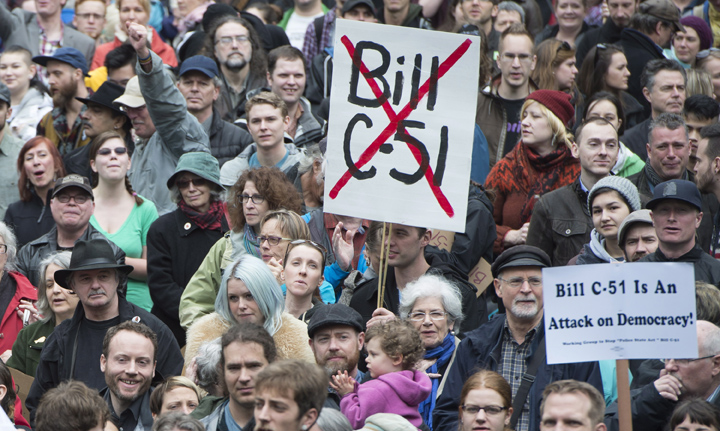The federal government’s new anti-terror laws impinge on Canadians’ fundamental rights and freedoms, two civil liberties groups allege.

The Canadian Civil Liberties Association (CCLA) and Canadian Journalists for Free Expression (CJFE) will file a Charter challenge against Bill C-51, Ottawa’s anti-terrorism act, in Ontario Superior Court today.
The twenty-one page application contends various parts of the law violate sections of the Charter of Rights and Freedoms pertaining to legal rights, mobility rights and fundamental freedoms.
READ MORE: Hacker group Anonymous claim Bill C-51 motive behind cyber attack on Federal government websites
CJFE President Tom Henheffer believes the new law should be deemed unconstitutional.
“We consider it incredibly dangerous,” Henheffer said. “It is the biggest threat to Charter rights in Canada right now and the worst legislation we’ve seen in this country in recent history.”
The Anti-terrorism Act, previously known as Bill C-51, became law in June but generated controversy almost immediately after it was introduced in January.
It expands Canada’s spy agency’s powers and allows government agencies – including the Canada Revenue Agency and other administrative bodies – to give Canadians’ personal information to the spy agency if they think it could be useful.
READ MORE: Does the Conservatives’ new anti-terror law contravene their own law?
Public Safety Minister Steven Blaney has long insisted the new tools are needed to combat the growing threat of terrorism.
But critics argue the new powers are too broad, the law’s language too vague oversight too scant. They also note there’s no indication police or intelligence officials are even using the added powers they were given following 9/11.
The groups behind the challenge are aware the upcoming federal election could change things – the NDP has said it will repeal the new law if it forms government; the Liberals have vowed to amend it – but intend to seek their day in court regardless.
“We filed this with the full intent of going to the Supreme Court of Canada,” Henheffer said.




Comments